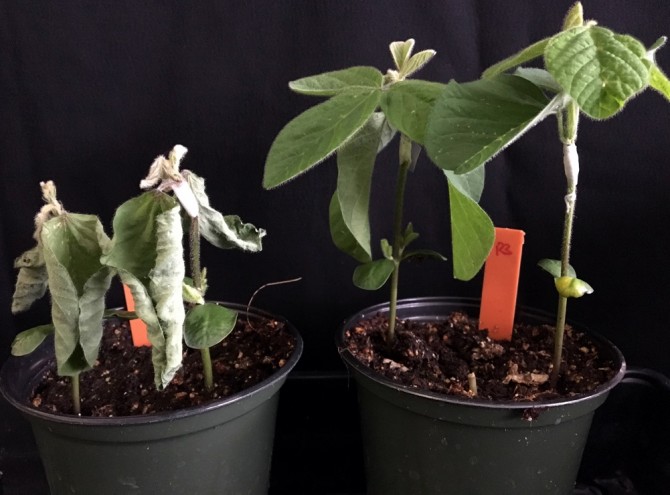Ascribe Bioscience receives NSF small-business grant
By Aaron J. Bouchie
Ascribe Bioscience, which applies the emerging field of metabolomics to the soil microbiome to develop new products for agriculture, has become the first company based on technology developed at the Boyce Thompson Institute (BTI) to receive a National Science Foundation Small Business Innovation Research (SBIR) grant.
The agricultural biotech startup will use the $225,000 Phase I award from the NSF to develop a seed treatment technology that protects plants from a broad range of pests and pathogens.
Ithaca-based Ascribe was founded in 2017 by BTI scientists and Cornell faculty members Frank Schroeder and Daniel Klessig, BTI senior research associate Murli Manohar, and local entrepreneur Jay Farmer.
Metabolomics is an emerging field focused on the systematic study of small-molecule metabolites produced by organisms. Ascribe’s discovery platform applies metabolomics to understand the mechanisms by which the soil microbiome affects crop health.
“There is great interest in leveraging the soil microbiome as a sustainable approach to improving crop health,” said Farmer, the company’s CEO. “Ascribe Bio’s approach of developing products based on the small molecules that mediate plant-microbiome interactions will provide farmers with solutions that are reliable, easy to use, and avoid the risks and complications associated with live microbe-based products.”
The company’s NSF grant is funding the commercialization of research from Klessig and Schroeder’s labs relating to ascarosides – a family of signaling molecules that are produced by microscopic worms called nematodes. Nematodes are part of the soil microbiome and communicate with each other using ascarosides as a chemical “language.”
“We wondered whether plants might have learned to perceive and interpret nematode signals, given that plant roots have been constantly exposed to parasitic nematodes and their excretions in the soil throughout their evolutionary history,” Klessig said.
The researchers found that ascarosides induce plant defense responses and dramatically enhance their resistance against pathogens, even at extremely low concentrations.
“We discovered that plants perceive a nematode-specific chemical signature and then upregulate their immune systems in interesting ways,” Schroeder said. The plant’s immune response doesn’t get fully turned on, but it becomes “primed” to recognize pathogens more rapidly, he said.
The results have now been validated for a range of agriculturally important pathogens that affect major crops, including rice, wheat, corn, soybeans, barley, tomatoes and potatoes.
“When you directly suppress a pest or pathogen, it creates selection pressure that causes resistant strains to emerge and flourish,” said Manohar, Ascribe’s CTO. “Because ascarosides do not kill the pest or pathogen, we do not believe that development of resistance to these compounds will be an issue.”
These potential benefits will become even more important as climate change expands the range of many pests and pathogens, which are becoming increasingly resistant to chemical pesticides. Indeed, farmers use nearly 6 billion pounds of pesticide worldwide each year, but pests and pathogens still destroy an estimated 37 percent of crops.
The SBIR funds, announced in late January, have enabled the company to hire three scientists to focus on formulation and production advances needed to launch a commercial product.
Ascribe is symbolic of BTI’s recent efforts to increase translation of scientific discoveries to real-world applications through the creation of new companies, said Paul Debbie, BTI’s director of new business development and translational science.
“This NSF award is further evidence that BTI’s discovery research has tremendous potential to yield commercial products that could provide great benefits to society,” Debbie said.
Klessig is also an adjunct professor in the School of Integrative Plant Science in the College of Agriculture and Life Sciences; Schroeder is a professor of chemistry and chemical biology in the College of Arts and Sciences.
Aaron J. Bouchie is a science writer at the Boyce Thompson Institute.
Media Contact
Get Cornell news delivered right to your inbox.
Subscribe

